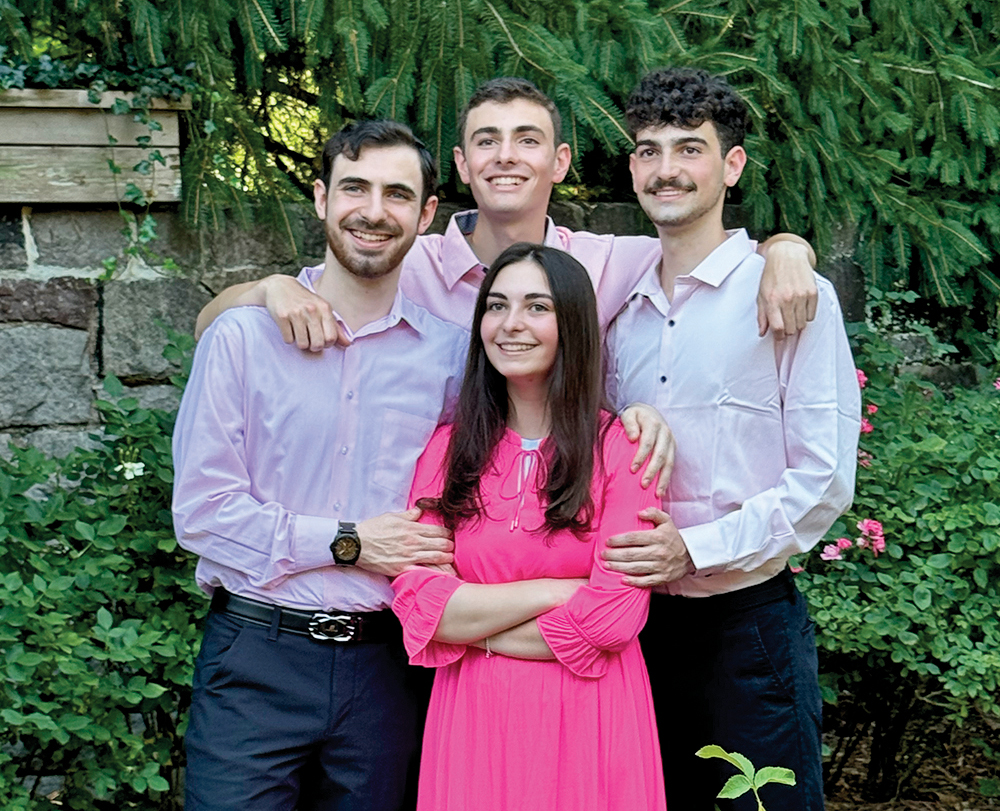
As parents still healing from the trauma of nearly losing a child, we were overwhelmed to find ourselves surrounded by hundreds of people in Keter Torah on November 17, 2024, as we held a seudat hodaah to celebrate our son Akiva’s miraculous recovery from a life-threatening illness, and to thank the thousands of people who contributed to his recovery through tefillah and mitzvot.
As we approach Chanukah, collectively embracing pirsumei nissa—publicizing the well-known miracles of the holiday that happened bayamim hahem, it feels even more poignant to share a less-known miracle that unfolded for us bazman hazeh. Although our story is a private experience, we believe it is important to publicize this miracle in which yad Hashem is evident and can inspire the masses to see divine intervention and engender an ethos of thankfulness. And thus, we share the story of our journey of communal unification, divine intervention, and publicizing miracles with hearts full of gratitude…
May 31, 2024 was an ordinary Friday. We were hosting guests for a Shabbos sheva brachot, the chicken soup was cooking, gefilte fish was in the fridge, and our 17-year old son, Akiva, came home from his last day of 11th grade and went out to play hockey—as we said, ordinary. When Akiva came back inside all sweaty and complaining of a headache, we assumed he was dehydrated from playing in the heat with all his gear and told him to drink water, take Tylenol, and lay down before getting ready for Shabbos. But, after his nap, Akiva still had a headache and did not feel up to going to shul. After candle lighting, though, Akiva came downstairs saying he felt a bit better and joined us for the Friday night seuda. Other than having a slight headache and acting a bit tired, Akiva seemed to be his usual self. Just an ordinary Friday night.
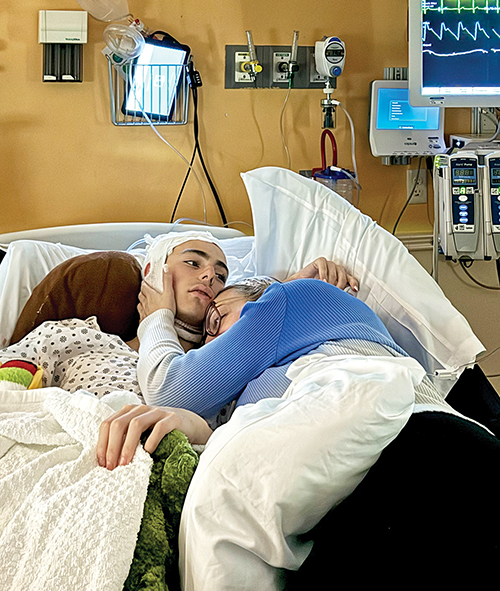
The next morning, Akiva had a high fever and complained that the front of his head was hurting. We assumed it was likely a sinus infection and planned to take him to urgent care after Shabbos. He slept most of the day, and as Shabbos was coming to a close, Akiva joined us downstairs and rested on the couch, where he remained through Havdala. But when we tried engaging him to take him to urgent care at around 9:45 p.m., we noticed that he was not responding to our prompts. When asked direct questions, Akiva did not respond; rather he gazed back blankly with absolutely no comprehension evident in his expressionless stare. We made the instantaneous choice to forgo urgent care as originally planned, and to call Hatzalah—which arrived at our home within minutes. Akiva’s lack of responsiveness coupled with troubling vitals resulted in him being carried out of our home and rushed to Hackensack Hospital’s pediatric emergency room by 10:30 p.m. In the span of two hours, our ordinary lives had completely turned upside down.
Upon admission to the ER, Akiva demonstrated concerning eye movements, which we learned were a focal seizure. In a frenzy, the doctors and nurses immediately took him for an emergency CT scan, drew blood and performed a lumbar puncture to help diagnose the cause of his altered mental state and seizure. Terrified, we watched and waited helplessly as our Akiva just stared off with open eyes, still unresponsive.
In the hours that followed, Akiva was given a series of heavy antibiotics to combat the potential bacterial infections causing his altered state, and we held our breath as we waited to see if they had any effect. We were soon relieved to see Akiva slowly regaining consciousness and beginning to interact with us. But our joy quickly turned to horror when we realized that while Akiva recognized us as familiar people, he could not recall our names, didn’t know who we were, and didn’t know where he was. What was going on!? As Saturday night turned into the wee hours of Sunday morning, Akiva began acting more like himself—and again we breathed a sigh of relief, thinking the worst was behind us and believing Akiva would be discharged home before breakfast. But our hopes were dashed when the doctors explained they were concerned Akiva had meningoencephalitis—an inflammation of the brain and its covering. Akiva would need to continue receiving heavy antibiotics, and needed to be admitted to the epilepsy monitoring unit to monitor his brain activity.
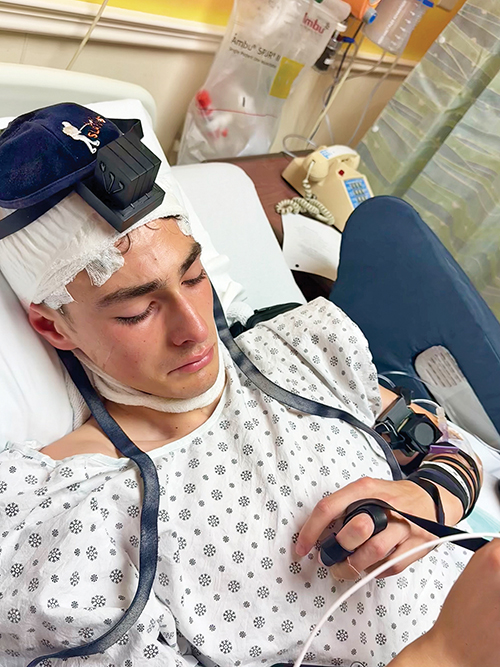
A mere five hours from the start of what we assumed would be a quick ER visit, we were left in a state of shock and fear, processing life-changing news. How could this be?! There must be some mistake; this is just a sinus infection, a headache! Akiva is a very healthy kid: strong as an ox. an engineering student, lifeguard, on the TABC volleyball team. And less than 12 hours later, we experienced one of the most terrifying things a parent can witness, as our sweet Akiva, mid-conversation, began to violently convulse in a full tonic-clonic seizure. Never before had we experienced a more helpless feeling, unable to do anything for our son, each passing second feeling like an eternity. This day, in our newly discovered lexicon, became known as Day 1.
Following his first seizure, Akiva was moved to the pediatric intensive care unit. While we hoped his seizure was a singular isolated event, as the hours and days passed, the seizures only increased in frequency and intensity. Despite the bombardment of numerous strong antibiotics, multiple anticonvulsant infusions and other medications to reduce his fever, Akiva’s seizures grew in number and intensity, and his fever climbed higher. Moments of calm when Akiva was awake, talking or joking around, were abruptly shattered with another seizure, recurring nearly every hour or two. The doctors implemented every known protocol, and yet nothing was working. We had never felt more scared and helpless as we watched our son losing his sense of reality and lucidity, slipping away—all we could do was wait.
But during this darkest time, something magical occurred. We found ourselves surrounded by so many family members, friends and rabbanim, whose visits, calls, texts and meals filled us with energy and vigor. On Day 2 in the ICU, WhatsApp groups were formed in which Tehillim was being recited by thousands of people around the world—many complete strangers—all rallying for Akiva and storming the heavens for Divine mercy on his behalf. We lovingly referred to the members of these groups as our “Tefillah Army,” and we relied on their recitation of Tehillim, performance of hafrashat challah, and various acts of chesed and Torah study—when we did not have the physical or emotional strength to put into words what we so desperately needed to ask Hashem. We found so much love and comfort as we witnessed the chats grow from dozens of people to hundreds and then thousands. Night and day, the chats roared with vigor and passion. Tehillim was recited in an infinite outpouring of prayer on Akiva’s behalf, in shuls and schools across our community and the world.
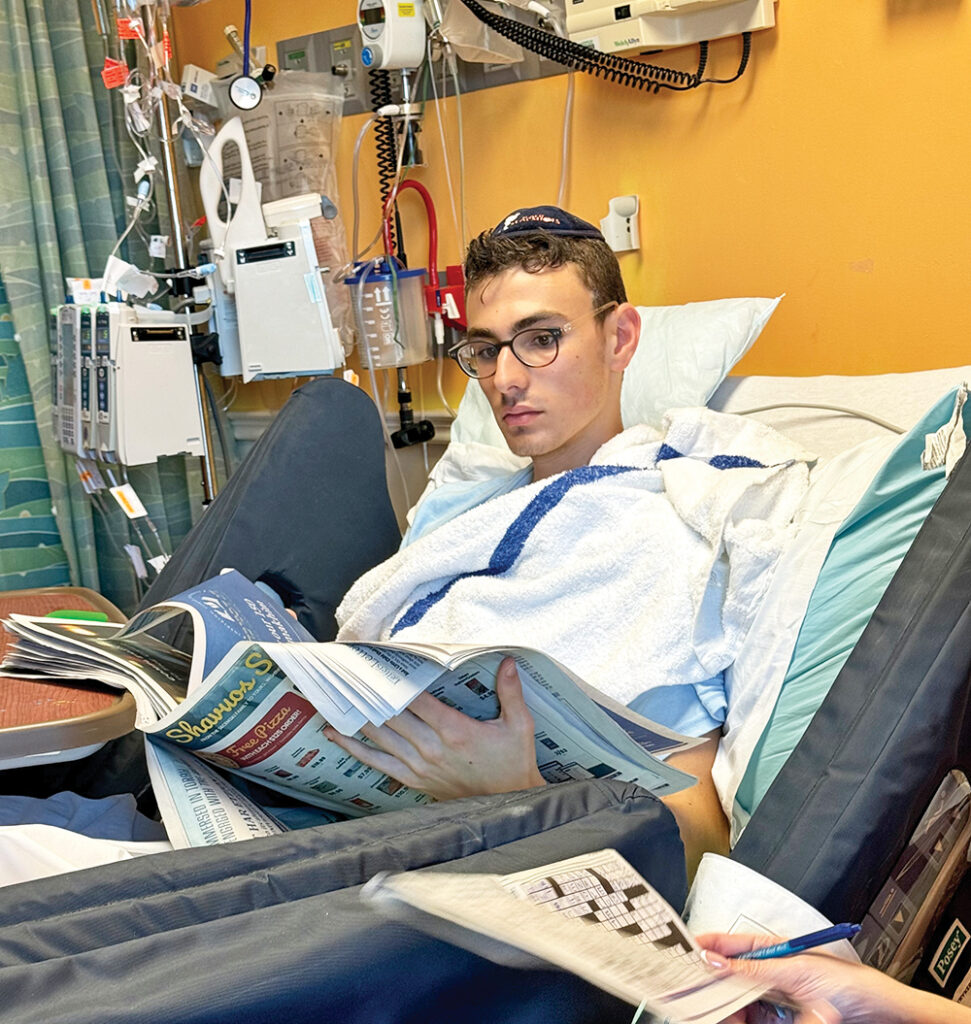
Feeling so connected and grateful, we tried to end each day by posting an update on Akiva’s condition. Crafting the updates was painful, vulnerable and exhausting, but also cathartic, much as journaling helps unburden the soul. But the posts served a much greater purpose—to inspire our Tefillah Army to continue beseeching Hashem on Akiva’s behalf. After each update was posted, no matter the hour, the already spirited pace of Tehillim recitation took on a renewed fervor.
Although we were in a state of crisis, the more we opened our eyes and truly paid attention, the more we saw Hashem’s presence and loving hand in every moment of each day—no matter how difficult things were. Yad Hashem became the theme that carried us in the days, weeks and months to follow. How fortunate were we that we were with Akiva at home the moment he became unresponsive! How incredible that the Hatzalah members who came so quickly not only took Akiva to the right hospital but knew our family and were able to advocate for immediate attention! How blessed were we that Akiva was on the epilepsy monitoring unit when his seizures started! How grateful we were that they connected Akiva to an EEG before the seizures even started! How relieved we felt that the neurology team was walking past Akiva’s room at the precise moment his seizures began! And on Day 4 in the ICU, we started seeing miraculous changes in Akiva’s condition—no fever, reduced seizure activity, increased lucidity—which clearly began occurring as the Tehillim chats reached capacity (over 1,000 people) and over 150 people signed up to perform hafrashat challah, recite Shir Hashirim and learn Torah.
After Akiva was in bed for a full week, we could not believe our eyes, as we watched on Day 8, as he took his first aided step from his bed to a chair. We were again in awe on Day 10, as all the EEG, EKG and blood pressure leads were removed and Akiva began his journey of physical and occupational therapies. Although he could not write his own name, and his deficits were still unknown, we were so grateful to see Akiva’s continued progress. Days 11 and 12 we celebrated Shavuot in the ICU and watched in amazement as Akiva took his first walk outside of the unit, getting some fresh air for the first time in almost two weeks. On Day 16, Akiva was discharged from Hackensack Hospital to Kessler Institute where he underwent intensive inpatient rehabilitation—hours of cognitive, physical, occupational and speech therapies—to regain his balance, improve mobility, and strengthen his speech, emotional regulation and cognition. On Day 27, Akiva received an aliyah in shul and recited birkat haGomel, thanking God for sparing his life.
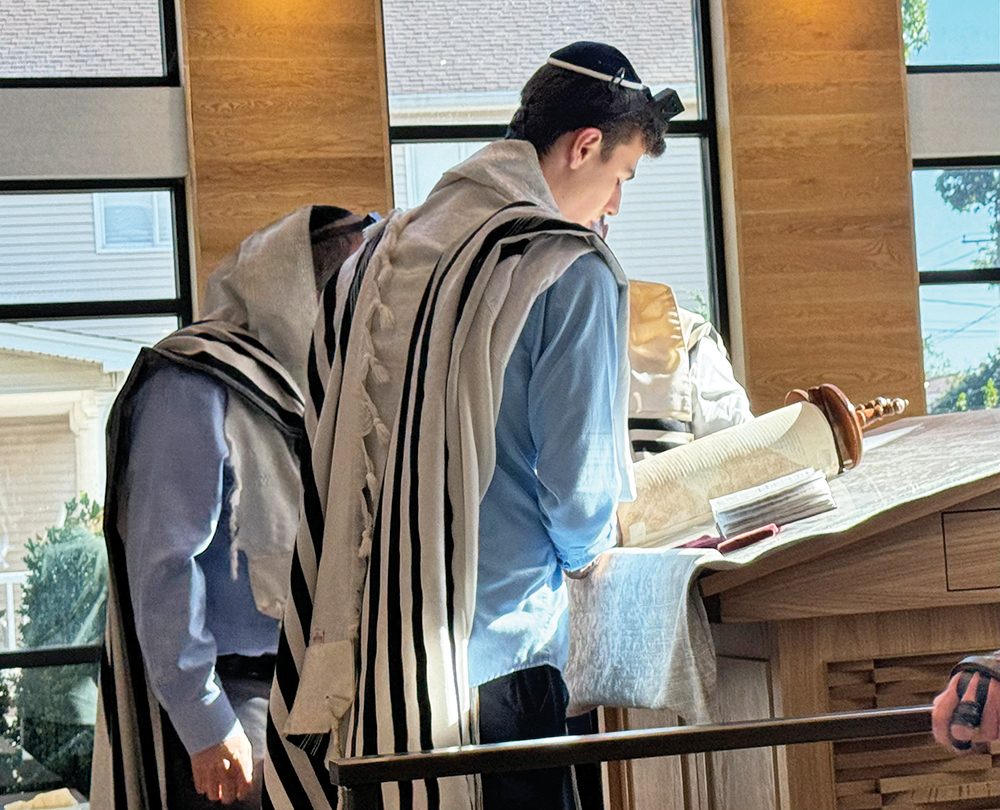
As Akiva transitioned home, we were still in a haze. Baruch Hashem, Akiva was sleeping again in his own bed. Did this nightmare really happen? On the outside, Akiva looked the same as before, but he still had a long summer of rehabilitation and weaning off countless medications before we would know the extent of his cognitive abilities or whether he could return to school.
But the Tehillim chat never grew silent, and on Day 96 we watched tearfully as Akiva, backpack and tefillin in hand, walked into TABC, joined his classmates for his first day of 12th grade! The profoundness of the miracle cannot be understated! In the span of three months, Akiva transformed from an unresponsive critical patient to a fully recovered young adult with zero long-term deficits. Baruch she’hecheyanu v’kiyimanu l’zman hazeh!
On Day 167, after a month of being off all medications, Akiva underwent a final EEG, and our Tefillah Army stormed the heavens yet again asking Hashem to return favorable results. We later received the report from the doctor that showed completely normal brain activity. Hodu l’Hashem ki tov!
Baruch Hashem, with the support of more than 42,000 perakim of Tehillim, over 400 hafrashat challahs performed, the dissemination of hundreds of asher yatzar cards, and hundreds of hours of Torah learning and shiurim as a zechut for Akiva Shalom ben Chana Zissel, Akiva has experienced a complete recovery! This week, December 4 is Day 187 of Akiva’s journey to complete recovery, and hopefully the last day that we will ever thus count as Akiva has his final appointment with his neurologist, during which he will iy”H be discharged from neurology and cleared to resume driving (as he was not permitted to drive for six months following his final seizure, which occurred on June 5). Zeh hayom asah Hashem, nagila v’nismicha bo!
We now set our eyes to the future and Akiva sets his eyes forward to April when he will iy”H run the Jerusalem Marathon to raise money for Shalva. Ein od milvado!
While each moment in the hospital, rehab and throughout the recovery process seemed to present new challenges, our Tefillah Army stayed strong and Hashem’s loving presence remained clear, cradling us when we needed to be held and supported the most. Our journey has taught us to open our eyes and actively find and appreciate the yad Hashem in our every day—the small hugs and sometimes huge embraces Hashem sends our way. And when we receive those signs of love, we close our eyes, take a deep breath, and express our gratitude to Hashem for the reminder that He always “has our back.”
While we publicize miracles to thank Hashem and bring glory and honor to Him, it is also an opportunity for us to train ourselves to see the yad Hashem in our every day. In fact, a perfect example occurred just this week as we came across an old text to Rabbi Sobolofsky. We had a robin’s nest with eggs inside perched on our front porch, and we wanted to know if we could perform the mitzvah of shiluach haken. When the rav replied affirmatively, Ari and Akiva immediately went outside, shooed the mother bird, removed an egg, and then returned it to its place, completing the mitzvah. So simple and mundane a process, the memory slipped our mind. The date of the text and mitzvah? May 27, 2024—a mere four days before Akiva fell sick. The reward for this particular mitzvah? Arichut yamim. The midrash also states the reward is a merit to have children. Hashem had created the remedy to our son’s illness before he ever felt sick—and we were only able to perceive the depth and breadth of His love nearly six months after the fact. What makes this vignette only more astounding—we had a bird’s nest in front of our home every year for the past eight years (at least), and we never before performed the mitzvah. And, the day after the mitzvah was performed, the eggs disappeared and the mother no longer roosted. We were truly able to appreciate that Hashem orchestrated the timing of the mitzvah precisely when its reward was needed—this is the essence of seeing yad Hashem all around us.
And so, now that we have performed the mitzvah of pirsumei nissa, and this now-public miraculous journey comes to a close, we are so honored to express our deepest hakarat hatov to Hashem for the nissim we experienced; to our Tefillah Army for all of their time, prayers, tears; and to the doctors, nurses and staff in the Hackensack Hospital pediatric ICU and in Kessler Institute for Rehabilitation for their dedication to Akiva’s care. These varied pieces came together so beautifully to keep Akiva alive and to remind us of how loved we have been by Hashem every step of the way.
We invite you to participate in our celebration recounting Akiva’s miraculous journey, Hashem’s infinite kindness, and the gratitude we hold deep in our heart by visiting tinyurl.com/akivas to read the updates from the ICU and hear the speeches shared at the seudat hodaah. It will certainly inspire you to open your eyes to the yad Hashem evident in our daily lives and experience the deep gratitude we now hold in our hearts—for nissim, for Hashem’s love, and for the kindness of klal Yisrael.
As we light our menorahs and perform the mitzvah of pirsumei nissa in just a few short weeks, let us pray for the privilege of actively perceiving yad Hashem as His light penetrates the deep darkness in the world; so we may be zoche to sing songs of hakarat hatov for all of Hashem’s nissim as we welcome Mashiach b’miheiru b’yameinu.
Rabbi Dr. Ari Sytner works as a couples therapist and professor of social work at Yeshiva University. Chana (aka Susan) is a commercial real estate attorney in private practice. The Sytners live in Bergenfield, are blessed with four truly incredible kids, and are iy”H making aliyah this summer—and they hope you will join them.









